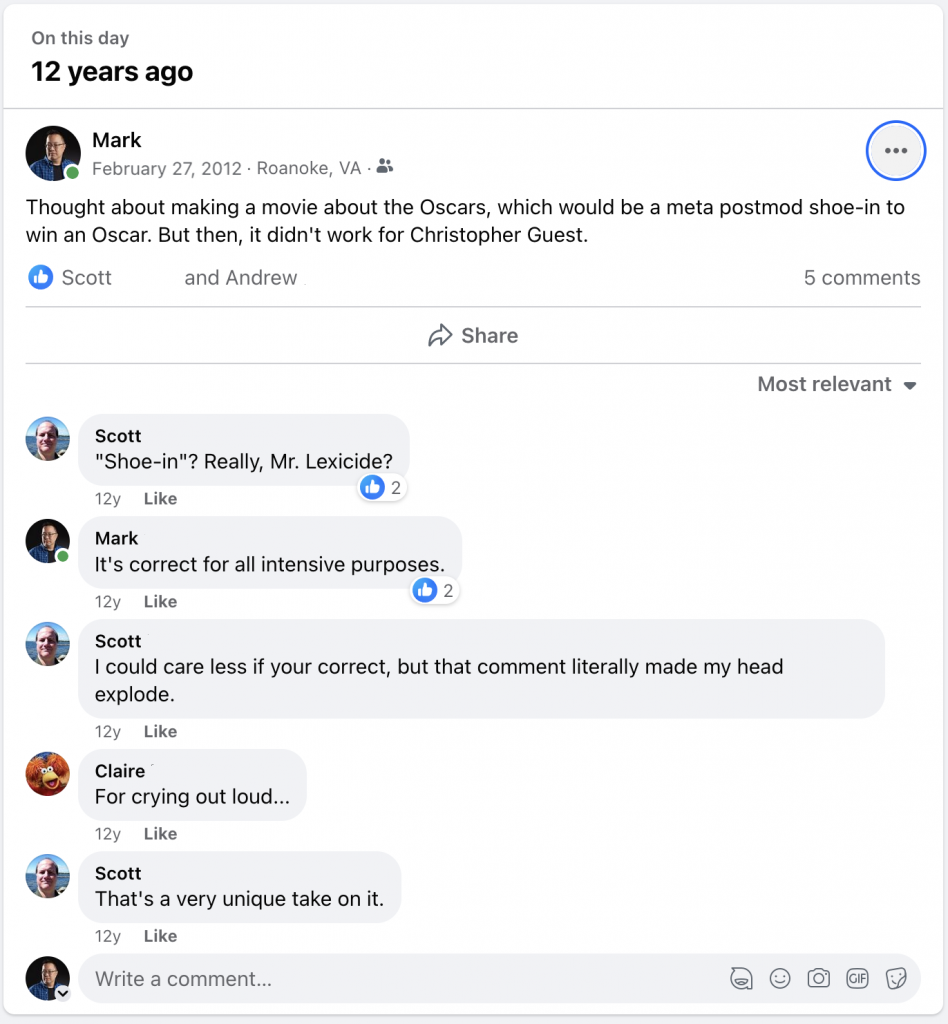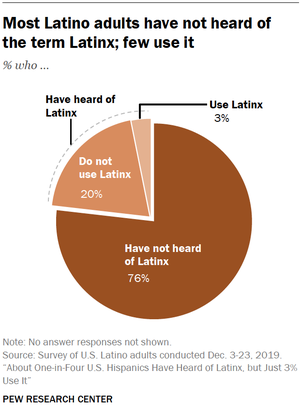
Memories are made of this


EX OFFICIO: as a result of one’s status or position
PRO FORMA: (adjective) done or produced as a matter of form, as pro forma reports, or (adverb) as a matter of form or politeness, as he nodded to him pro forma, or (noun) a standard document, form or financial statement
Despite how it looks, ex officio (or ex-officio) does not mean “out of office.” I mean, it does, but more precisely it’s understood to mean “proceeding out from the office,” just as deus ex machina is “god from the machine.” Since we all bandy about our ex-wives, ex-boyfriends, or ex-parrots, it’s understandable so many people think ex-officio is a synonym for OOO or a former office holder.
Not so. When I discovered this active clothing company, I assumed that’s why they chose this name—their wares were to wear “out of the office.” Their About Us page says otherwise. Although why an adventure-themed company would choose Ex Officio as its name vexes me so. Perhaps their marketing department would care to comment?
Ex officio refers to a post one holds by virtue of another post held by the same person. The reigning monarch of the United Kingdom is the ex officio head of the Church of England. The Vice President of the United States is ex officio the president of the Senate. There need not be anything “elite” about this, despite the company’s protestations. In many companies, the IT manager is the ex officio webmaster. (This is a terrible idea, by the way, and 100% of IT managers agree with me.)
Pro forma has taken on the perjorative connotation of “mindless CYA,” and that is more understandable, since the actual definition kisses that concept. Why, then, would you name your promotional merchandise company Pro Forma? I get it sounds like “performance,” I get it has “pro” in it. But you’re kinda sorta saying your customers are only giving away swag or employee recognition for no other reason than because it’s the done thing, not because you have an intense passion for cool branded merch.
Fortunately, I couldn’t come across any news or blog posts grossly misusing these terms. Just these sorta-kinda company names. Let’s keep it that way
— Otto E. Mezzo
O for a news of wire!
https://www.bbc.com/news/uk-55233021
Two patients, both alike in dignity
Against corona did they lay vaccines
From ancient puns break new comedy
Where Shakespeare japes make Twitter feeds obscene.
The second person to receive “the jab” against COVID-19 is none other than… William Shakespeare. As good luck would have it, the game was afoot immediately, with the slings and arrows of outrageous punning giving us pause.
But only for those who are familiar with the Bard’s work. As I lamented in a past article, that number is dwindling. The fault, dear readers, is not Instagram, but in ourselves, that we are underread.
— Otto E. Mezzo
“You can’t appreciate English literature unless you are to some extent at least steeped in the King James Bible.”
C. S. Lewis? G. K. Chesterton? Hannah More?
Try Richard Dawkins.
A celebrated atheist Dr. Dawkins is, but he’s also a lover of deep turns of phrase, made richer by years of repetition in the Anglophone culture. It was not Heinlein’s Valentine who was the original stranger in a strange land, but Moses (Exodus 2:22). James Dean was not exiled east of Eden before Cain was (Genesis 3:24). And long before Aesop’s fox rejected the sour grapes, it set the Israelite’s teeth on edge in Ezekiel 18:2.
The list goes on. A stumbling block; a drop in the bucket; the valley of the shadow of death; no rest for the wicked; eat, drink, and be merry; turn the other cheek; and go the extra mile all come verbatim from the Bible (specifically, the King James Version). Only Shakespeare comes close to providing so many common English turns of phrase.
In a past article, some of you claimed it made life no richer to know why Achilles’ heel was weak or how and by whom the Gordian knot was finally undone. To you “barbarians” (Dawkins’ word, not mine), riddle me this: are you your brother’s keeper? If you are cast into the lion’s den, do you hope against hope or weep and gnash your teeth? Did David beat Goliath? Did Solomon split the baby?
Still not convinced? He that has ears, let him hear:
— Otto E. Mezzo
So this happened.
The inciting event? During Judge Amy Coney Barrett’s confirmation hearing, she used the term sexual preference in answer to a question from Senator Mazie Hirono:
“I have never discriminated on the basis of sexual preference and would not discriminate on the basis of sexual preference.”
Hirono hit back:
“Sexual preference is an offensive and outdated term, it is used by anti-LGBTQ activists to suggest that sexual orientation is a choice. It is not.”
Apparently, Merriam-Webster’s online dictionary felt the need to back Senator Hirono up. Within hours, they changed the definition of preference to “offensive” when used to describe sexual orientation.
On my personal Facebook page, I designated this as a “hit job.” I got a lot of pushback from my progressive friends, who claimed this change needed to be made and didn’t see any ill will in the timing. I responded dictionaries are descriptive, not prescriptive. No one moved an inch, probably more due to our opinions on Barrett and Democrats than our views on lexicographies.
So I thought I’d bring in Lex, the silent partner of Lexicide.com.
Despite our avowal to political neutrality (not correctness nor agnosticism), Lex and I do actually have opinions. I (Otto) am a Southern conservative. Lex is a Bay Area liberal. My part of the conversation is italicized. Lex’s is boldfaced.
Is the dictionary descriptive or prescriptive?
Dictionaries are businesses. They follow the money.
You didn’t answer the question.
You pointed out a while back that there is only a benefit to a business in taking the progressive side.
I did?
Yes. I think your reasoning is that conservatives don’t go in for boycotts and cancellations, whereas liberals do. So if a company has to choose, they’ll pick the squeaky wheel.
That seems like something I would have said. And I think it’s true now. Once upon a time, some Baptists boycotted Disney over a lesbian fish, although that was ineffective, wrong-headed, and something 90% of conservatives disagreed with.
And I’m not sure 90% of us on the left find “preference” offensive. But to answer the question, regardless of whether dictionaries should be descriptive or prescriptive, they are supposed to be authoritative. I argue they lose their authoritative position when they pull stunts like this.
So you don’t agree with Merriam-Webster’s move?
I think the timing makes it clear it was anti-Barrett. Or pro-Democrat.
Maybe they were just protecting themselves.
Yes, possibly. No one wants to get canceled. Which is another topic altogether. The trouble is this sort of move drew more attention to itself and hurt the left’s position.
Exactly. Living here, where you constantly have to prove you’re on the right side of history —it’s hard to keep up and quite exhausting. But you make your point whenever you have the opportunity. That’s what I think Merriam-Webster was doing.
Is sexual preference offensive?
I’ve done a lot of onboarding employees at various tech companies. HR materials are the touchstone for where we are in terms of sensitivities and what’s offensive at any given time. I’ve never seen “sexual preference,” only “sexual orientation.”
Orientation seems to be the “preferred” (heh) term.
I’ll be here all night, folks!
Perhaps you don’t see it because it is considered offensive.
That’s quite possible. To be honest, I haven’t heard that “preference” is a term to avoid. I think context matters. If Ralph Reed uses it, maybe it’s offensive. Advocate, not so much.
Because you know they’re allies.
Correct.
None of your LGBTQ friends find sexual preference offensive?
What grandstanding senators and NPR commenters find offensive doesn’t carry a lot of weight with the person on the street. As you pointed out, Kenny Ortega used the term in Advocate and nobody gnashed teeth over it. Yours?
I can’t think of a time I’ve used the phrase sexual preference or sexual orientation with any of them. We don’t sit around talking about the existential condition of being gay.
Why the hell not?!
I’ll make sure to awkwardly introduce the subject next time. You said context matters. Amy Coney Barrett is assumed to be homophobic, then? Biden uses the word preference.
For a person of Biden’s age, I’d expect him to say “homosexual” and not mean it callously. Barrett is younger than we are. I seriously doubt she’s actively anti-LGBTQ.
She is a staunch Catholic. She likely hews to a Christian orthodox view of marriage and sexuality.
If so, then she must have at some point raised a bigger red flag than “sexual preference.” Also, I would argue the contention that it’s offensive makes assumptions that aren’t there. What is doing the preferring?
Explain.
What is the subject of the preference? If it’s a person’s DNA, then that comports with scientific orthodoxy on sexual alignment.
“Scientific orthodoxy!” I could do a whole column on that.
I’m a scientist. I know of what I speak. Anyhow, we assume the “preference” is some caprice, some choice of the person. But it could also describe a leaning that’s influenced by biology.
I’m troubled by your comment on context. Don’t words have the same meanings and connotations regardless of who utters them? Barrett apologized afterward; she wasn’t aware the word was offensive (if indeed it is). If she’s a homophobe, she’s not a very committed one.
That brings us to another reason why Hirono pounced and why Merriam-Webster caved. Linguistic gatekeeping. You see this all the time out here. A small group claims authority over a word or group of words, or they designate certain phrases offensive that have always been neutral. In doing so, they claim power over others. The linguistic gatekeeping trend is very odious. It creates division and confers a sense of superiority, except that superiority is not earned — it’s simply there to fence out people, to deny them a part in the conversation.
We (I) have written about this a lot lately, with Black and Latinx. I remember a while back, NPR declared Latino and Latina correct rather than Hispanic. But my Latinx article made it clear people with Latin American heritage prefer Hispanic. Moreover, government forms use Hispanic.
Who decided? It’s a fight for authority.
Why can’t Hispanics decide? I and my family referred to ourselves as Oriental growing up in the 1980s, then a white friend tells me I can’t use that term because it’s “othering.”
White people are weird. I say that as a white person.
It seems like we’re back to whether dictionaries are or should be descriptive vs prescriptive. You refuse to take a position on this? I say they have a duty to be descriptive.
Maybe the OED’s motto should be “We report. You decide”?
Okay, point taken. I guess dictionaries are also prescriptive. They mark up words with [vulgar], for example. I say you should never use foul language in business, government, or journalistic communications. Obviously, many news outlets disagree, and several of my friends urge swearing in any kind of document. I should point out these friends are uniformly progressive.
If someone doesn’t like Merriam-Webster’s handling of this, they can start a competing dictionary.
Or Lexicide can refuse to cite Merriam-Webster in the future. For surrendering its authority to demonstrate its fealty to a political group.
Another problem with linguistic gatekeeping is you will always be behind the curve. Maybe M-W should have added the “offensive” tag ten years ago. No matter what they do, they’ll always be chasing the new trend. As I mentioned, it’s very stressful.
One of the advantages of being a retrograde reactionary. What’s the next linguistic shift?
I predict sexual identity will replace orientation.
That term exists already. Why should it ascend, other than to keep the linguistic gatekeepers in avocado toast?
To encompass asexuals, people who say they have no sexual interest. Orientation assumes you fall somewhere on a spectrum from straight to gay. That’s offensive to those who identify as asexual.
Asexual has a very specific scientific meaning. It doesn’t mean “sexually uninterested,” any more than “intersex” means the same as “gender fluid.”
This biologist agrees. I was conscious of that while using the term. It makes me think of amoebas. But as Lexicide constantly argues, meanings do shift.
I don’t like words with a specific meaning suddenly taking on another meaning just because someone uses it wrong. Non-libidinous people have a right to eschew sex. But it doesn’t make them asexual creatures.
I think we can and perhaps should defend shifts in meanings. But not for spiteful purposes, as Hirono tries to do, with Merriam-Webster’s support. Not if it exists only to fence people out and deny them a part in the conversation.
Speaking of which, this conversation needs to be denied further oxygen. It’s late.
Agreed.
Politics ruins everything. I refuse to let it ruin the English language.
On this, it appears the late Julian Bond, Georgia state senator and chair of the NAACP, seems to have agreed. We have cited him here before, when he defended a Washington, D.C., mayor’s aide who used the word niggardly in a meeting. Bond was not confused about the word’s meaning, nor was he offended. In this article by one of Bond’s former assistants, the civil rights leader apparently also quipped, “Guess I can’t go to Cancun on vacation.”
Mr. Samuelson felt compelled to write in response to the relatively minor dust-up surrounding a professor’s utterance of a Chinese filler phrase. You may have heard the story: The USC business school prof included the Chinese words nei ge in a lecture on international communications. Some students banded together to call Patton out, saying he had “offended all of the Black members of our class.” Ironically, Patton said he offered the example to foster greater inclusivity and understanding of diverse cultures. No good deed, you know.
If you’re a Lexicide regular, I’m betting real money you side not with the “Black MBA candidates c/o 2022” (for no one signed his individual name to the letter of grievance), but with Mr. Bond, who famously said, “You hate to think you have to censor your language to meet other people’s lack of understanding.” The aggrieved MBA candidates disagree, apparently: “This phrase…is always identified as a phonetic homonym and a racial derogatory term, and should be carefully used, especially in the context of speaking Chinese within the social context of the United States.”
There are many, many homonyms or near-homonyms that Anglophone use wrong. Stagnant does not mean static. Bemused is not the same as amused. Duplicitous has never meant duplicated. A reasonably educated person (I assume a USC MBA candidate qualifies) is expected to know these truths. Likewise, a mildly erudite Asian American does not find offense at “chink in the armor,” nor does an Italian American take umbrage at “whopper,” nor Latinos to “spic and span.” And those are actual homonyms, not close calls.
The University of Southern California missed an educational opportunity here. The dean could have told his students to get out from their little bubble and see the world from a Chinese speaker’s perspective (which was the point of the lecture). Instead, he groveled and removed Professor Patton from the class, at least temporarily. In the scheme of cancellations, this one had small import for Patton’s career. But for the students? They learned knee-jerk sensitivities and quickness to anger are higher virtues than global understanding and language comprehension.
And for that, Julian Bond is turning in his grave.
— Otto E. Mezzo
And just like clockwork, the same day we published our jeremiad on Latinx, out comes this NPR story:
According to the story, only 3% of Hispanic Americans surveyed use the term Latinx to describe themselves. As we reported yesterday, most Chicanos (how’s that for a flashback?) prefer Hispanic. But the true preference is to be called by their actual national origin (or their family’s national origin): Mexican-American, Salvadoran-American, and so on. That is, when they refer to it at all.

Why even have a catch-all term like Hispanic or, in my case, Asian? (Incidentally, both groups have historically been classified as White. More on that another time.) When uppity Euro-Americans call me out for being a “hyphenated American,” I remind them I didn’t ask to be distinguished by the national origins of my ancestors. If not for government forms or worrying if the Asian designation would deny my son admission to college, I might never have occasion to use the term. Wouldn’t that be nice?
The NPR story also seems surprised Latinx hasn’t caught on after 20 years. Considering the term was the province of academics, we are not the least bit shocked. The man and woman on the street doesn’t care what advanced degree holders think, at least when it comes to language. The clunky, overthought attempt at inclusivity that is Latinx not only has no history, you can’t spell it (some have tried LatinX) and you sure as heck can’t say it.
— Otto E. Mezzo
We don’t like linguistic flights of fancy. (If you’re surprised by that, you haven’t been following us. Hey, you can rectify that right now!) Words made-up on the fly, erroneous words made canon, incorrect usages legitimized—these rankle us and we make no apologies for that. No, we’re not really prescriptivists. We think English is better off without an Académie anglais (irony, folks!). But we also think it would be better off if people used words in ways most people understand. Penultimate has only one definition, and yet people are afraid to use it for fear of being misconstrued. The only fear we should have is the fear of being shunned from polite society, of being denied meat and drink, for, say, using solvency to mean “solving cases.”
We also don’t like wading into political waters. We are proud of our political stances and make no apologies for them, either. But we’ve found Americans get overly invested in politics-as-identity, to the point that the weight of an opinion, analysis, or scientific finding is determined solely by the author’s politics (at least in the reader’s mind). We think this is a sign of feeble thinking. If William Safire declares surety means “guarantee” instead of “certainty,” it carries the same weight as if Noam Chomsky says it. (Except that Safire is dead. Details.)
Two months ago, we covered the (somewhat) political minefield of Black vs black (and also white vs White). We ended up agreeing with Kwame Anthony Appiah‘s thesis. How about Latinx?
How about it. Behold, an October, 2019, statement from then-presidential candidate Elizabeth Warren.
When I become president, Latinx families will have a champion in the White House. #LatinxHeritageMonth pic.twitter.com/yIcoBHGjMV
— Elizabeth Warren (@ewarren) October 15, 2019
And then…
Liberalism’s Latinx Problem – The New York Times
Progressives, Hispanics are not ‘Latinx.’ Stop trying to Anglicize our Spanish language – USA Today
Warren Turns Back on ‘Latinx’ in Major Campaign Departure – Washington Free Beacon
While I had read Latinx in print, Elizabeth Warren was the first person I’d heard pronounce the word. Or try to. I know many of us were jarred hearing “Latinecks.” Maybe we were expecting “Latinks” Like minx or Manx.

Yes, kitty, it doesn’t sound right to us either. Maybe that’s because it’s a clunky, unnatural construction made up simply to avoid an age-old “problem”—gendered language.
This is not the first time English speakers have tried to navigate this. In ancient Greek, Αδελφοι (adelphoi) means “brothers”, but can also encompass “brothers and sisters.” If there are 999 women in a room and one man, you would address them as Αδελφοι. Some progressive Bible translations try to get around this by substituting “believers” or “people,” but this negates the familial model St. Paul and others are encouraging the early church to adopt. The English Standard Version goes, in my estimation, too far back in the other direction, sticking to “brothers” even when context makes it clear women are present.
So that’s the needle Latinx tries to thread. And clearly whoever came up with the term was wearing asbestos work gloves while doing it. Spanish speakers have never had a problem understanding Latinos includes women, and Mr. Sopo even goes so far as to accuse Warren of Anglicizing his language. I would agree with him, except English doesn’t mangle words with a misplaced X, either. Oh wait.
How The Letter “X” Creates More Gender-Neutral Language
Rory Gory, Teen Vogue contributor extraordinaire aside, does any modern English speaker use Mx. or womxn? Apart from the gender politics of those words, how do you pronounce them? Are they even useful? I agree with (and have addressed) the usefulness of Ms., and clearly the majority of Anglophones take the same view. Time will be the judge of Mx. and its ilk. As for Latinx, even Senator Warren has abandoned it:

— Otto E. Mezzo
P.S. Most Latinos prefer “Hispanic” anyway.
UPDATE: Well well, this very day comes this insightful report from NPR.

STRAW MAN: “An intentionally misrepresented proposition that is set up because it is easier to defeat than an opponent’s real argument.” – Oxford English Dictionary
STRAW MAN PROPOSAL: “A straw-man proposal is a brainstormed simple draft proposal intended to generate discussion of its disadvantages and to provoke the generation of new and better proposals.” – Wikipedia
When I first entered the corporate world, I heard many terms that had established meanings in business (sometimes due to wrong usage) which contradicted established definitions (see postmortem) or were so uncommon I confused them with similar words (see incent). I’ve been dealing with straw man proposals for some time now, but when I first heard it, I wanted to shout, “AW HELL NAW! DEATH TO LOGICAL FALLACIES!” But decorum and experience with business jargon stayed my tongue. And my career is the better for it.
That young marketing director had only encountered straw man fallacies—the debate tactic where you substitute an easy-to-defeat alternative for your opponent’s thesis. From recent coronavirus-centered (of course) news:
As the fall winds on, the teacher unions risk being seen as tone-deaf given the expectations for other essential employees—especially if Trump loses his re-election bid, robbing the union leaders of their familiar straw man.
– “Are Teachers Unions Overplaying Their Hands?” The Dispatch, July 31, 2020
Political agnosticism aside, Donald Trump is pretty much the perfect straw man. Somewhere there is a tweet of his that is reckless, boorish, and topical enough for your argument. But chances are it will also be a non-sequitur, which is another logical fallacy altogether. Attacking “evil” Trump instead of the issue at hand is a straw man fallacy, just as to Trump’s supporters, the hypocrisy of the mainstream media, the UN, and House Democrats also serve as convenient straw men.
The term straw man proposal originates from the same source—namely, a dummy used for melee practice. While the fallacy accuses one of choosing the easily-won battle (as a great warrior said, “boards don’t hit back”), the proposal purposely sets up a weak proposal to find the flaws. Or more often, the term is used to describe a first draft the team is supposed to dissect. I guess straw man sounds more learned.
Straw man proposal as a term has some venerability, so I can let this one slide. Considering how uneducated most college graduates are on logical fallacies (evidenced by the absolutely worthless arguments I’ve encountered), there probably won’t be much confusion with the other straw man. Good thing they don’t hit back.
– Otto E. Mezzo
References: https://en.wikipedia.org/wiki/Straw_man_proposal
https://thedispatch.com/p/are-teachers-unions-overplaying-their